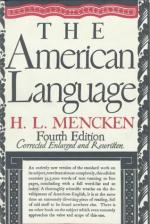|
This section contains 336 words (approx. 1 page at 400 words per page) |

|
Chapter 9.7 Summary
Mencken remarks that English adjectives have a simple reputation: 1) they are only inflected during comparison; 2) they are typically used correctly by Americans; 3) many adjectives work for multiple meanings; and 4) the rare occasions of incorrect use happen as double superlatives or comparatives. After a few examples of the third tendency, and after justifying the logic behind some adjectival "errors," Mencken transitions to focus on the speed with which adjectives are made. He says they are made less rapidly than substantives or verbs, a phenomenon he likens to "more primitive varieties of speech." Suffixes are rare, and prefixes are limited. The author concludes that adjectives are American "rubber stamps" of speech, as many individual adjectives cover a range of meanings.
Chapter 9.7 Analysis
Characteristic of adjectives, says the author, is their only occasional mistaken use. Sometimes Americans say, "more better." This incorrectness is actually based on...
(read more from the Chapter 9.7 Summary)
|
This section contains 336 words (approx. 1 page at 400 words per page) |

|




